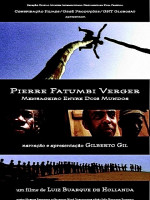Pierre Fatumbi Verger: Mensageiro Entre Dois Mundos Filming Locations
Pierre Fatumbi Verger: Mensageiro Entre Dois Mundos Filming Locations
Benin, a French-speaking West African nation, is a birthplace of the vodun (or “voodoo”) religion and home to the former Dahomey Kingdom from circa 1600–1900. In Abomey, Dahomey's former capital, the Historical Museum occupies two royal palaces with bas-reliefs recounting the kingdom’s past and a throne mounted on human skulls. To the north, Pendjari National Park offers safaris with elephants, hippos and lions.
Paris, France's capital, is a major European city and a global center for art, fashion, gastronomy and culture. Its 19th-century cityscape is crisscrossed by wide boulevards and the River Seine. Beyond such landmarks as the Eiffel Tower and the 12th-century, Gothic Notre-Dame cathedral, the city is known for its cafe culture and designer boutiques along the Rue du Faubourg Saint-Honoré.
Rio de Janeiro is a huge seaside city in Brazil, famed for its Copacabana and Ipanema beaches, 38m Christ the Redeemer statue atop Mount Corcovado and for Sugarloaf Mountain, a granite peak with cable cars to its summit. The city is also known for its sprawling favelas (shanty towns). Its raucous Carnaval festival, featuring parade floats, flamboyant costumes and samba dancers, is considered the world’s largest.
Salvador, the capital of Brazil’s northeastern state of Bahia, is known for its Portuguese colonial architecture, Afro-Brazilian culture and a tropical coastline. The Pelourinho neighborhood is its historic heart, with cobblestone alleys opening onto large squares, colorful buildings and baroque churches such as São Francisco, featuring gilt woodwork.
Pierre Fatumbi Verger: Mensageiro Entre Dois Mundos (2000)
Documentary about French-born Pierre Verger, who lived between Bahia (Brazil) and Africa from 1946 until his death in 1996, and dedicated himself to photograph and research the Candomblé rites, becoming himself deeply involved with the religious communities. This film includes his very last interview to Brazilian composer Gilberto Gil, one day before Verger's death at 93.
